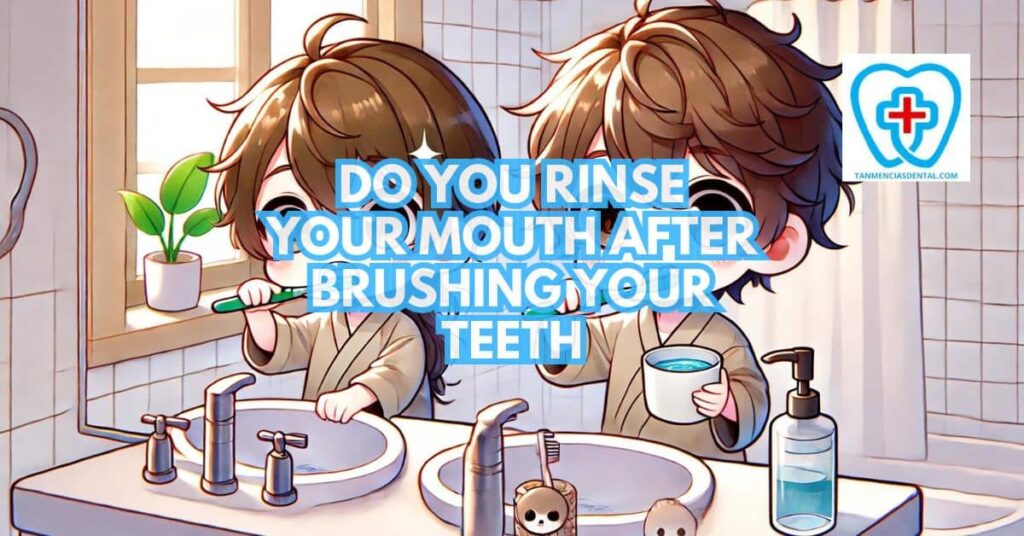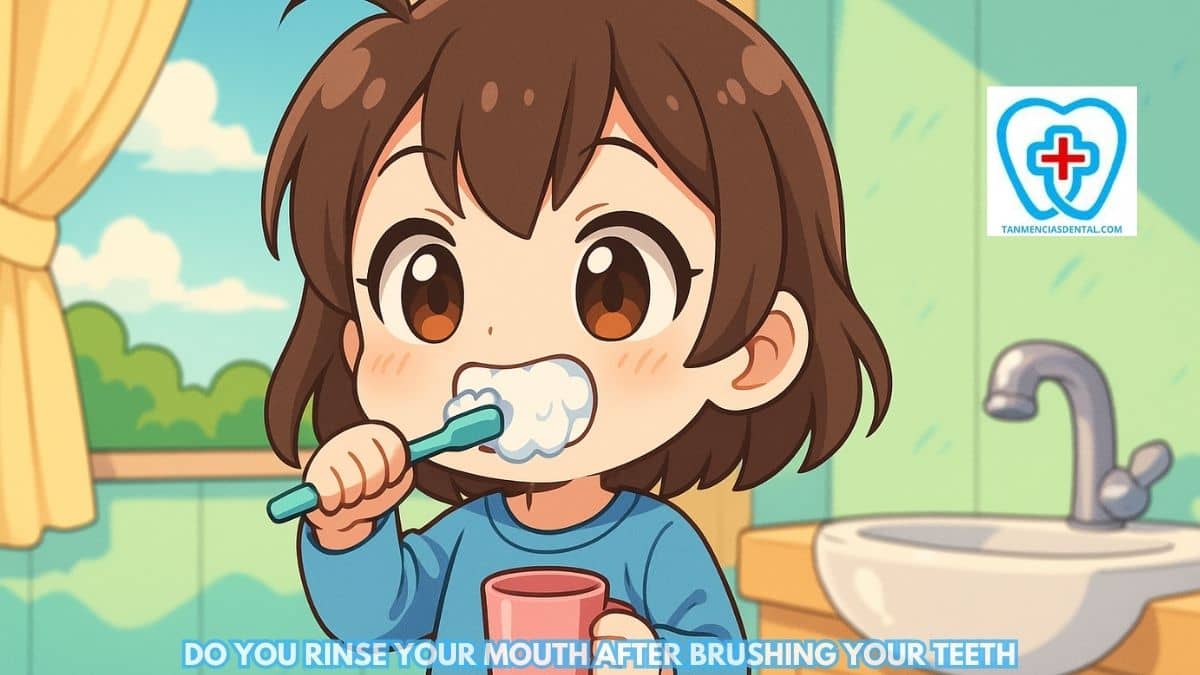When thinking about oral care, a common question comes up: Do you rinse your mouth after brushing your teeth?
Some people rinse because it makes their mouth feel clean, while others avoid rinsing to let the toothpaste keep working.
The choice matters because rinsing can change how much fluoride stays on your teeth and how well it protects them.
Knowing the benefits and drawbacks of rinsing helps you choose what works best for your dental health.
We’ll look at both sides of the question so you can build a routine that keeps your teeth strong and healthy.
1. The Power of Fluoride: Why Spitting (Not Rinsing) Might Be Better
Fluoride in toothpaste strengthens tooth enamel and helps prevent tooth decay.
By rinsing immediately after brushing, you might wash away this protective layer, reducing the effectiveness of fluoride.
Spitting out the toothpaste instead allows fluoride to remain on your teeth, enhancing its benefits.
This approach can be especially important for those prone to cavities or with weakened enamel, as the fluoride continues to work even after brushing.
Allowing fluoride to sit on your teeth provides a longer exposure time, which can lead to better dental health.
When children brush their teeth, it’s beneficial to teach them to spit out the excess toothpaste rather than rinse, so they get the most out of the fluoride.
Using fluoride toothpaste and avoiding rinsing after brushing can be a simple yet effective way to prevent tooth decay and keep your teeth strong.
🦷 Is It Bad To Brush Your Teeth After Every Meal?
2. Wait Before Eating or Drinking After Brushing
Fluoride from toothpaste needs time to strengthen your teeth after brushing.
Eating or drinking right away can wash the fluoride off before it has a chance to protect the enamel.
Dentists often suggest waiting about thirty minutes so that the fluoride can stay on the teeth and work properly.
This short waiting time helps the teeth absorb minerals and makes them stronger against decay.
By giving the fluoride enough time, you make your brushing routine more effective and supportive of long-term oral health.
🦷 The Connection Between Drinking Alcohol and Gingivitis
3. Rinse, Repeat? The Role of Mouthwash in Oral Hygiene
Mouthwash can be a helpful addition to your oral hygiene routine, especially if it contains fluoride to help strengthen your teeth.
However, it’s important to use it at the right time.
If you rinse after brushing your teeth with mouthwash, you might wash away the concentrated fluoride from your toothpaste, reducing its effectiveness.
For those with sensitive teeth, this can be particularly important, as fluoride helps to protect and desensitize the enamel.
Instead, consider using mouthwash at a different time of day, such as after lunch or before bed.
This way, you can enjoy the benefits of both fluoride and mouthwash without compromising your oral health.
By timing your use of mouthwash properly, you can maintain stronger teeth and better overall oral hygiene.
🦷 Can Periodontal Gum Disease Be Reversed?
4. Fresh Breath vs. Strong Teeth: Balancing Act After Brushing
Rinsing your mouth after brushing can leave you with a fresh, clean feeling.
However, this might come at the cost of stronger teeth.
To balance fresh breath and strong teeth, consider using mouthwash separately from brushing.
This allows you to remove food particles and bacteria while still maintaining the protective benefits of fluoride.
Finding the right balance can help you achieve both fresh breath and healthy teeth.
🦷 Basic Dental Care Vs Routine Dental Care: What’s the Difference?

5. Myth Busted: Does Rinsing Really Remove All Bacteria?
Many believe that rinsing thoroughly removes all bacteria from the mouth.
While rinsing can remove some bacteria, it is not the most effective method.
Brushing and flossing are more effective in disrupting plaque and bacteria that adhere to the teeth and gums.
The mechanical action of brushing removes more bacteria than rinsing alone.
Therefore, relying solely on rinsing may not provide the comprehensive cleaning your mouth needs.
🦷 Can Children Use Electric Toothbrushes? Is It Safe and Effective for Them?
6. Taste the Difference: Overcoming the No-Rinse Challenge
Not rinsing after brushing can leave a lingering taste of toothpaste in your mouth.
Some people find this uncomfortable and struggle to adjust.
To overcome this challenge, gradually reduce the amount of water you use to rinse until you no longer rinse at all.
You can also try different toothpaste flavors to find one that leaves a more pleasant taste.
This way, you can reap the benefits of not rinsing while maintaining comfort.
🦷 How to Treat Gingivitis in Toddlers: A Parent’s Guide
7. Expert Advice: Dentists Weigh In on the Rinse vs. No-Rinse Dilemma
Dentists often recommend not rinsing after brushing to maximize fluoride exposure.
However, personal preference and comfort are also important considerations.
Some dentists suggest spitting out excess toothpaste but not rinsing with water to allow fluoride to remain on the teeth longer.
It’s best to consult with your dentist to determine the best routine for your specific oral health needs.
Their professional advice can help you make an informed decision that supports your dental health.
🦷 How Sedation Dentist Procedures Help Patients Overcome Dental Anxiety
8. Kid-Friendly Oral Care: Teaching Proper Brushing and Rinsing Habits
Teaching children good oral hygiene habits is crucial for their long-term dental health.
Encourage them to spit out toothpaste instead of rinsing immediately.
Use fun and simple explanations to help them understand the benefits of fluoride and how it protects their teeth.
Make brushing a fun activity with songs or games to keep them engaged.
Establishing these habits early can lay the foundation for a lifetime of good oral hygiene.
🦷 How to Keep Your Teeth Clean With Braces: A Helpful Guide
9. Beyond Brushing: The Importance of Flossing and Regular Dental Checkups
Good oral hygiene is more than just using a toothbrush and rinsing your mouth each day.
Flossing reaches between teeth where a toothbrush cannot, removing plaque and food that often cause cavities and gum problems.
Without flossing, plaque can harden into tartar, which only a dentist can remove during a professional cleaning.
Regular dental checkups allow dentists to check for early signs of cavities, gum disease, or other issues that a toothbrush alone cannot prevent.
These visits also give you the chance to get advice on proper brushing, flossing, and other tools that may improve your daily routine.
By combining the use of a toothbrush, floss, and regular dental care, you build a complete system to protect both teeth and gums.
🦷 Should I Brush My Teeth Before Using Whitening Strips?
10. Optimal Oral Health: Creating a Personalized Rinsing Routine
There is no single routine that works for everyone, and the choice to rinse or not depends on your own dental needs.
Your dentist may recommend different habits depending on your risk for cavities, gum sensitivity, or the concentration of fluoride in your toothpaste.
If your toothpaste has a higher concentration of fluoride, avoiding rinsing can help more of it stay on the teeth and provide longer protection.
Some people may prefer to rinse lightly or use mouthwash at a different time of day to keep a balance between freshness and fluoride benefits.
It is important to pay attention to how your mouth feels after brushing and make small adjustments until you find what feels right.
By creating a rinsing routine that fits your comfort and fluoride needs, you can support stronger teeth and better overall oral health.
🦷 Dental Diagnostics In Marikina
11. Night vs. Morning: When to Rinse and When to Skip
Consider the timing of your brushing routine when deciding whether to rinse.
In the morning, you might prefer rinsing to feel fresher throughout the day.
At night, skipping the rinse can allow fluoride to protect your teeth while you sleep.
Tailor your routine to fit your lifestyle and oral health goals.
Balancing these factors can help you maintain both fresh breath and strong teeth.
🦷 Marikina Dental Clinic for Families
👨⚕️ Conclusion
The question “Do you rinse your mouth after brushing your teeth?” doesn’t have a definitive answer.
It depends on individual preferences and oral health needs.
By understanding the pros and cons, you can make an informed choice that supports your dental health.
Tailor your oral hygiene routine to find a balance that works for you.
Remember, the best routine is one that keeps your mouth healthy and comfortable.
😊 Self-Promotion
Visit Tan-Mencias Dental Clinic in Parang, Marikina City, for a friendly and professional dental care experience.
Our team is dedicated to keeping your smile healthy and bright.
Have questions or need to book an appointment?
You can reach us by calling 9171451074, sending a message through our Facebook page, or using the contact form on our website.
We’re here to help with all your dental needs!
❔ FAQs
1. Should I rinse my mouth with water after brushing my teeth?
It is better to spit out the excess toothpaste instead of rinsing with water.
Rinsing right away washes away the fluoride before it has time to protect your teeth.
2. How long should I wait to eat or drink after brushing?
Dentists often suggest waiting about 30 minutes after brushing.
This gives the fluoride time to strengthen your teeth and make them more resistant to decay.
3. Can I use mouthwash right after brushing?
Using mouthwash immediately after brushing can wash away the fluoride from toothpaste.
It is more effective to use mouthwash at a different time of day, such as after a meal or before bed.
4. What should children do after brushing their teeth?
Children should be encouraged to spit out toothpaste instead of rinsing with water.
This helps keep fluoride on their teeth longer and improves cavity protection.
5. Is rinsing ever a good choice?
Rinsing can be helpful if you want a fresh taste or need to remove food particles, but it may reduce fluoride benefits.
The best choice depends on your comfort and your dentist’s advice.

